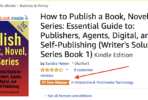Writing Experts–Who Should You Trust?

When you ask an expert, you expect, well, the perfect answer, right? Yet, sometimes the answer is wrong! Why? I was recently asked about editing genres not in my wheelhouse. Why did they even ask me, I wondered? And have I done the same thing—been impressed with someone for some reason and then asked questions that weren’t up their alley either? Mind you, I am thrilled people ask me for help, but … I know they would be better served by asking the RIGHT person for help with their specific needs. There are lots of experts, colleagues and like-minded people who have great credentials. We tend to trust experts and the successful. Why? Because they are schooled or experienced, and they must be doing something right. Right?

Besides, seeking an expert’s opinion is certainly better than the other options:
Like, friends who haven’t a clue what you are doing or why; family who can be the sweetest advocates or the worst detractors; fellow writers focused on their own writing track; the guy at the coffee shop who peeks over at your iPad; and, of course, the mass of info on the Internet.
To be fair, the Internet community has loads of professionals who can help you. But here are a few things to avoid on the Internet or elsewhere, that will save you the time and frustration of reaching the wrong expert for your needs:
AVOID:
- Experts who write more about their wildly successful journey than about how to help with yours.
- Info overload. There is just too darned much to ever read! Don’t get sucked into reading “not quite on the same subject” articles.
- Meaningless info. Need advice on writing your medieval fantasy? Then don’t read advice on writing romantic comedy. Both are on writing, sure, but each genre has its own specific needs.
- Sources without empathy. Your plot, voice, ideology, theme are important elements in your book. Listen only to those who grasp your intent—and can accept it—to avoid skewed advice.
How is a writer to plan, write, publish and promote their book? Here are my best suggestions:
SOLUTIONS:
- Read, read and read. Various advice is useful, sometimes if only to show you how contradictory it can be. Don’t only read about writing; read the actual genre you are writing. It astonishes me how often clients come to me admitting they haven’t read much in their genre. If you don’t like to read it, why write it? If you don’t know what else is in the market in your field, how can you compete?
- Sift and narrow. Cast off advice that isn’t related to your project or that flies in the face of everything else written on that point. Also ignore books written in your genre that you simply didn’t like (every genre has its variations—read those you enjoy).
- Look for like-minded advisors. As you’ve read and sifted, you’ve found writers and professionals whose opinions and views similar to your own. Concentrate on those voices for advice.
- Write, rewrite, revise. Find your own voice and path as a writer. The more you write, the more your tone and voice and special abilities will grow naturally.
- Trust yourself. This is the toughest step to success. There is only one bottom line authority on your book—YOU! You know where you want it to go, what you want it to say to readers, and how you want it to feel as scenes unfold. The good news is that the author is in control; the bad news is that the author in control.
- You’ll make mistakes; but you can fix them.
- You’ll be confused; welcome to the club!
In conclusion, writers, like everyone else, want to just turn to experts, get the right advice and have everything go swimmingly. The fact is that the decisions are all our own and we need to trust ourselves in the end. Writing is truly an adventure and the experts along the way can only hand you maps. You must decide which maps lead to your specific destination and only you can take the journey.
Want personal help with your writing project?
Contact me directly with an email and let’s discuss YOUR book project!
 Sandra Haven, Editor
Sandra Haven, Editor
Join me on Facebook and Twitter
Leave a comment:






